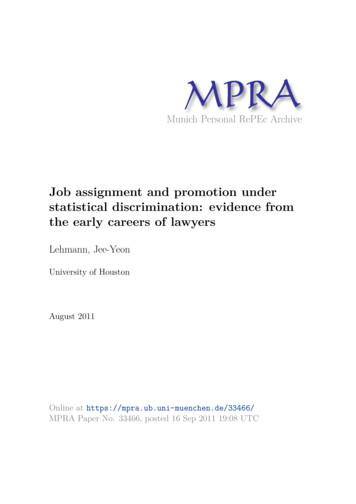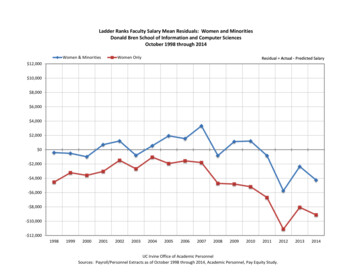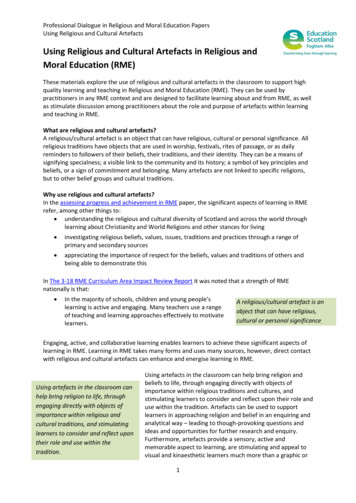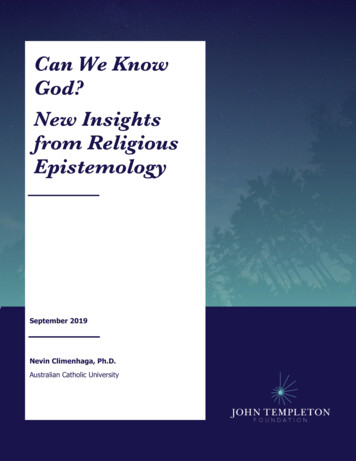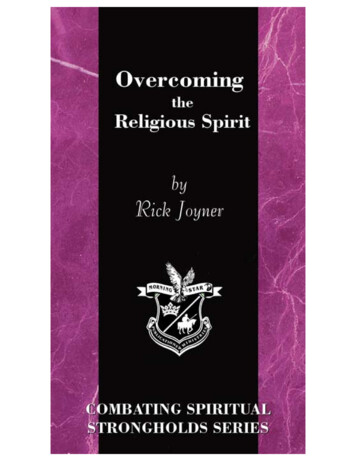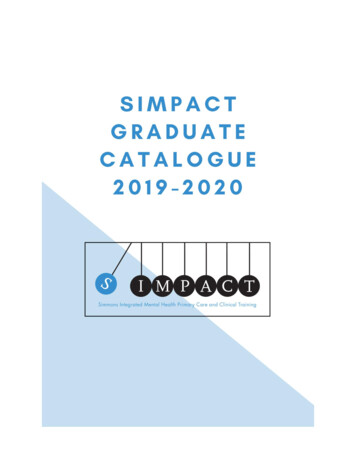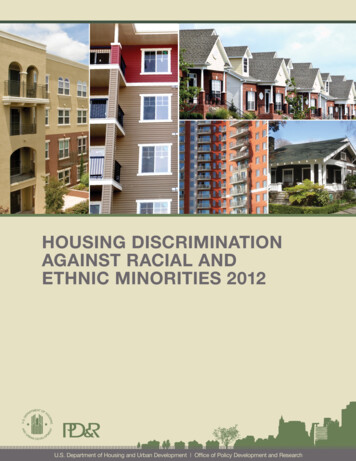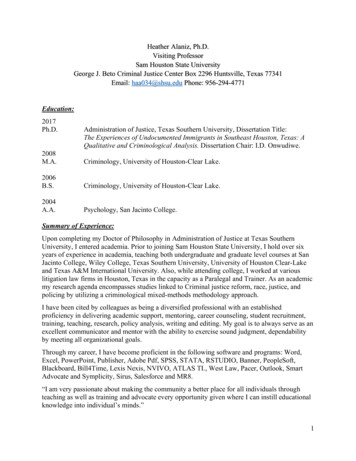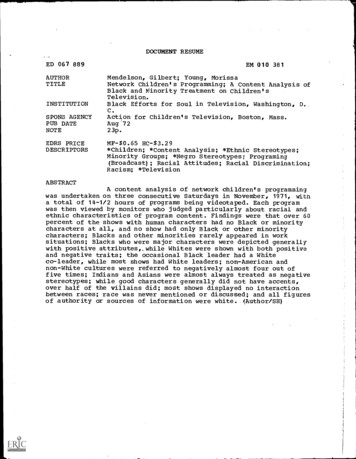
Transcription
Country Policy and Information NoteBangladesh: Religious minorities andatheistsVersion 3.0March 2022
PrefacePurposeThis note provides country of origin information (COI) and analysis of COI for use byHome Office decision makers handling particular types of protection and humanrights claims (as set out in the Introduction section). It is not intended to be anexhaustive survey of a particular subject or theme.It is split into 2 parts: (1) an assessment of COI and other evidence; and (2) COI.These are explained in more detail below.AssessmentThis section analyses the evidence relevant to this note - that is information in theCOI section; refugee/human rights laws and policies; and applicable caselaw - bydescribing this and its inter-relationships, and provides an assessment of, in general,whether one or more of the following applies: a person is reasonably likely to face a real risk of persecution or serious harm that the general humanitarian situation is so severe that there are substantialgrounds for believing that there is a real risk of serious harm because conditionsamount to inhuman or degrading treatment as within paragraphs 339C and339CA(iii) of the Immigration Rules / Article 3 of the European Convention onHuman Rights (ECHR) that the security situation is such that there are substantial grounds for believingthere is a real risk of serious harm because there exists a serious and individualthreat to a civilian’s life or person by reason of indiscriminate violence in asituation of international or internal armed conflict as within paragraphs 339C and339CA(iv) of the Immigration Rules a person is able to obtain protection from the state (or quasi state bodies) a person is reasonably able to relocate within a country or territory a claim is likely to justify granting asylum, humanitarian protection or other form ofleave, and if a claim is refused, it is likely or unlikely to be certifiable as ‘clearly unfounded’under section 94 of the Nationality, Immigration and Asylum Act 2002.Decision makers must, however, still consider all claims on an individual basis,taking into account each case’s specific facts.Country of origin informationThe country information in this note has been carefully selected in accordance withthe general principles of COI research as set out in the Common EU [EuropeanUnion] Guidelines for Processing Country of Origin Information (COI), April 2008,and the Austrian Centre for Country of Origin and Asylum Research andDocumentation’s (ACCORD), Researching Country Origin Information – TrainingManual, 2013. Namely, taking into account the COI’s relevance, reliability, accuracy,balance, currency, transparency and traceability.The structure and content of the country information section follows a terms ofreference which sets out the general and specific topics relevant to this note.Page 2 of 70
All information included in the note was published or made publicly available on orbefore the ‘cut-off’ date(s) in the country information section. Any event taking placeor report/article published after these date(s) is not included.All information is publicly accessible or can be made publicly available. Sources andthe information they provide are carefully considered before inclusion. Factorsrelevant to the assessment of the reliability of sources and information include: the motivation, purpose, knowledge and experience of the source how the information was obtained, including specific methodologies used the currency and detail of information whether the COI is consistent with and/or corroborated by other sources.Multiple sourcing is used to ensure that the information is accurate and balanced,which is compared and contrasted where appropriate so that a comprehensive andup-to-date picture is provided of the issues relevant to this note at the time ofpublication.The inclusion of a source is not, however, an endorsement of it or any view(s)expressed.Each piece of information is referenced in a footnote. Full details of all sources citedand consulted in compiling the note are listed alphabetically in the bibliography.FeedbackOur goal is to provide accurate, reliable and up-to-date COI and clear guidance. Wewelcome feedback on how to improve our products. If you would like to comment onthis note, please email the Country Policy and Information Team.Independent Advisory Group on Country InformationThe Independent Advisory Group on Country Information (IAGCI) was set up inMarch 2009 by the Independent Chief Inspector of Borders and Immigration tosupport him in reviewing the efficiency, effectiveness and consistency of approach ofCOI produced by the Home Office.The IAGCI welcomes feedback on the Home Office’s COI material. It is not thefunction of the IAGCI to endorse any Home Office material, procedures or policy.The IAGCI may be contacted at:Independent Advisory Group on Country InformationIndependent Chief Inspector of Borders and Immigration5th FloorGlobe House89 Eccleston SquareLondon, SW1V 1PNEmail: chiefinspector@icibi.gov.ukInformation about the IAGCI’s work and a list of the documents which have beenreviewed by the IAGCI can be found on the Independent Chief Inspector’s pages ofthe gov.uk website.Page 3 of 70
ContentsAssessment. 61.Introduction . 61.1 Basis of claim . 61.2 Points to note . 62.Consideration of issues . 62.1 Credibility . 62.2 Exclusion . 72.3 Convention reason(s). 72.4 Risk . 72.5 Protection . 152.6 Internal relocation. 162.7 Certification . 17Country information . 183.Religious demography . 183.1 Overview. 183.2 Geographical breakdown of religious minorities . 194.Legal context . 204.1 Constitution . 204.2 Personal status laws . 214.3 Education. 234.4 Registration of religious groups . 244.5 Penal code . 244.6 Blasphemy / religious defamation. 254.7 Religious minorities’ representation in the political sphere . 294.8 Religious conversion . 305.State treatment . 315.1 Overview. 315.2 Hindus . 345.3 Buddhists . 365.4 Christians. 375.5 Atheists and secularists . 385.6 Ahmadis. 405.7 Land appropriation . 416.Societal treatment and inter-religious relations . 426.1 Overview. 42Page 4 of 70
6.2 Hindus . 456.3 Buddhists . 526.4 Christians. 546.5 Atheists . 566.6 Ahmadis. 586.7 Inter-faith marriages . 597.Access to services . 618.Avenues of redress. 628.1 Police and judiciary . 628.2 State-funded Trusts . 628.3 Civil society organisations . 639.Internal relocation . 649.1 Freedom of movement . 64Terms of Reference . 65Bibliography . 66Sources cited . 66Sources consulted but not cited . 69Version control . 70Page 5 of 70
AssessmentUpdated: 30 March 20221.Introduction1.1Basis of claim1.1.1Fear of persecution or serious harm by state or non-state actors due to theperson’s religion or lack of religion.Back to Contents1.2Points to note1.2.1This note focuses primarily on the situation for Hindus, Christians, Buddhists,Ahmadi Muslims and atheists.Back to Contents2.Consideration of issues2.1Credibility2.1.1For information on assessing credibility, see the instruction on AssessingCredibility and Refugee Status.2.1.2Decision makers must also check if there has been a previous application fora UK visa or another form of leave. Asylum applications matched to visasshould be investigated prior to the asylum interview (see the AsylumInstruction on Visa Matches, Asylum Claims from UK Visa Applicants).2.1.3Decision makers should also consider the need to conduct languageanalysis testing (see the Asylum Instruction on Language Analysis).Official – sensitive: Start of sectionThe information on this page has been removed as it is restricted for internal HomeOffice use.Page 6 of 70
Official – sensitive: End of sectionBack to Contents2.2Exclusion2.2.1Decision makers must consider whether there are serious reasons forconsidering whether one (or more) of the exclusion clauses is applicable.Each case must be considered on its individual facts and merits.2.2.2If the person is excluded from the Refugee Convention, they will also beexcluded from a grant of humanitarian protection (which has a wider range ofexclusions than refugee status).2.2.3For further guidance on the exclusion clauses and restricted leave, see theAsylum Instruction on Exclusion under Articles 1F and 33(2) of the RefugeeConvention, Humanitarian Protection and the instruction on RestrictedLeave.Official – sensitive: Start of sectionThe information on this page has been removed as it is restricted for internal HomeOffice use.Official – sensitive: End of sectionBack to Contents2.3Convention reason(s)2.3.1Actual or imputed religion (incl. Atheists).2.3.2Establishing a convention reason is not sufficient to be recognised as arefugee. The question is whether the person has a well-founded fear ofpersecution on account of an actual or imputed Refugee Convention reason.2.3.3For further guidance on Convention reasons see the instruction onAssessing Credibility and Refugee Status.Back to Contents2.4Riska.State treatment: general2.4.1Bangladesh is a majority Islamic country, with the 2013 census showing 89%of the population belonged to the Sunni Islamic faith. The 2013 census dataestimated religious minorities to account for just over 10% of the population.The population of Bangladesh in 2022 is estimated to be over 167 million,meaning that those belonging to religious minorities could now be as manyas 16.7 million.2.4.2The largest religious minorities, as recorded in the 2013 census, wereHindus (approximately 10% or 15.2 million of the population in 2013), whomainly reside in the north and southwest of the country, though concentratednumbers of Hindus can also be found in the south, east and north of thecountry.Page 7 of 70
2.4.3The remaining 1% of the population is made up mainly by the followingreligions: Christians, (mostly Roman Catholic and Protestant) who mainly reside inBarisal, Khulna and Gazipur. Buddhists, who mainly reside in the Chittagong Hill Tracts and the northof the country. Ahmadis, who reportedly reside in Dhaka, Brahmanbaria andKishoreganj.2.4.4Bangladesh is a secular pluralist parliamentary democracy. The constitutionand other laws hold that Islam is the state religion but ensure equal statusand equal rights for all religions, specifically mentioning Hinduism, Buddhismand Christianity. The constitution also ensures secularism is upheld byprohibiting the abuse of religion for political purposes and by prohibitingdiscrimination or persecution of persons protecting any religion. It providesfor the right to profess, practise, or propagate all religions ‘subject to law,public order, and morality’, and states religious communities ordenominations have the right to establish and manage their religiousinstitutions. The constitution stipulates that no one attending any educationalinstitution shall be required to receive instruction in, or participate inceremonies or worship pertaining to, a religion to which they do not belong(see Legal context and State treatment - Overview).2.4.5The constitution also provides for the guarantee of freedom of thought andconscience and of speech and expression. However, in practice thegovernment sometimes fails to protect these rights especially if they aredeemed to criticise religious sentiment (see Legal context, Blasphemy /religious defamation and, on freedom of speech, the Country Policy andInformation Note on Bangladesh: Journalists, publishers and internetbloggers).2.4.6The law provides for the prosecution of offences committed against places ofworship such as criminal damage and trespassing, and offences committedagainst individuals due to their religion, such as intentional insulting words orbehaviour. However, there are examples of these laws and those under theDigital Security Act (which carries a sentence upon conviction of up to 10years imprisonment), being used to arrest and detain those allegedlyspeaking out against or insulting the principles of Islam. For example, in2019, a Hindu man was accused of posting blasphemous content onFacebook and arrested and detained under the DSA, in 2021, a 17-year-oldHindu girl was arrested and detained for a Facebook post critical of Islamand in 2020, a Sufi Muslim musician was arrested and detained for criticisingIslam on YouTube. The DSA has reportedly encouraged non-state actors totarget and pursue cases against individuals from varying backgrounds,platforms and religions suspected of blasphemy (see Penal code,Blasphemy / religious defamation and Atheists /and secularists).2.4.7President Abdul Hamid regularly hosts receptions to commemorate each ofthe principal Muslim, Hindu, Buddhist and Christian holidays and has publiclyemphasised the importance of religious freedom, tolerance, and respect forreligious minorities (see State treatment – Overview).Page 8 of 70
2.4.8There are no laws prohibiting religious conversion. However, it can beviewed as apostasy. Inter-faith marriages can take place under the SpecialMarriage Act although, under the Act, couples must declare their disbelief inany traditional religion (see Religious conversion, Inter-faith marriages andPersonal status laws).2.4.9There are no legal restrictions preventing Hindus, Buddhists, Christians orAhmadis from freely practising their religion, accessing state schools, healthor other government services (see Legal context – Education, Statetreatment and Access to services).2.4.10 For further guidance on assessing risk, see the instruction on AssessingCredibility and Refugee Status.Back to Contentsb.State treatment of Hindus2.4.11 In general, Hindus are able to express and practise their faith freelythroughout Bangladesh, including at established temples. Hindus arehistorically affected by land appropriation through the Vested Property Act –which allowed the government to confiscate property from persons it deemsas an enemy of the state. Despite laws allowing for the return of, orcompensation for, seized property, a large percentage of claims remainunresolved or have been denied by government officials, and ‘land grabs’and forced evictions are reported to continue (though the extent of which isnot clear) despite the Vested Property Act no longer existing, due to lack ofdocumentation proving ownership (see Land appropriation).2.4.12 Hindus in Bangladesh may face instances of local state discrimination inrelation to land ownership. However, in general, the treatment of Hindus bythe state is not sufficiently serious by its nature and/or repetition, or by anaccumulation of various measures, to amount to persecution or seriousharm. The onus is on the person to demonstrate otherwise. Each case mustbe considered on its own facts and merits.2.4.13 For further guidance on assessing risk, see the instruction on AssessingCredibility and Refugee Status.Back to Contentsc.State treatment of Buddhists2.4.14 Buddhists are a small minority (under 1% of the population) in Bangladesh,with most Buddhists being indigenous people living in the Chittagong HillTracts (CHT), a group of districts within the Chittagong Division in southeastern Bangladesh, bordering India and Myanmar. In general, Buddhistsare able to express and practise their faith freely throughout Bangladesh,including at established monasteries (see Religious demography and Statetreatment of religious minorities - Buddhists).2.4.15 There is little evidence to suggest that Buddhists in Bangladesh face statediscrimination and, in general, the treatment of Buddhists by the state is notsufficiently serious by its nature and/or repetition, or by an accumulation ofvarious measures, to amount to persecution or serious harm. The onus is onPage 9 of 70
the person to demonstrate otherwise. Each case must be considered on itsown facts and merits.2.4.16 For further guidance on assessing risk, see the instruction on AssessingCredibility and Refugee Status.Back to Contentsd.State treatment of Christians2.4.17 In general, Christians are able to express and practice their faith freelythroughout Bangladesh, including at established churches. A Christianeducation system operates throughout Bangladesh and is open to membersof all faiths. The system is held in high regard by the communities in whichthe schools and universities operate, which provides Christians with adegree of protection against harassment at the local level. Christians are notrepresented in the political sphere (see Legal context – Education, Statetreatment of religious minorities – Christians, Religious minorities’representation in the political sphere and Access to services –Christians).2.4.18 There is little evidence to suggest that Christians in Bangladesh face statediscrimination and, in general, the treatment of Christians by the state is notsufficiently serious by its nature and/or repetition, or by an accumulation ofvarious measures, to amount to persecution or serious harm. The onus is onthe person to demonstrate otherwise. Each case must be considered on itsown facts and merits.2.4.19 For further guidance on assessing risk, see the instruction on AssessingCredibility and Refugee Status.Back to Contentse.State treatment of Ahmadis2.4.20 Available evidence suggests that government officials have differentopinions regarding Ahmadis. Whereas some maintain a neutral position onreligious issues; others have openly declared Ahmadis as non-Muslims.2.4.21 There is limited evidence to suggest that Ahmadis in Bangladesh are directlydiscriminated against by the state. The government has come underpressure from Islamist groups to declare Ahmadis ‘non-Muslim’ and there isevidence that the police have been instructed to bring the position andactivities of the Ahmadis under nationwide surveillance. However, in general,the treatment of Ahmadis by the state is not sufficiently serious by its natureand/or repetition, or by an accumulation of various measures, to amount topersecution or serious harm. The onus is on the person to demonstrateotherwise. Each case must be considered on its own facts and merits.Back to Contentsf.State treatment of Atheists and people accused of ‘hurting religioussentiment’2.4.22 Although a secular country, the government is sometimes seen as usingreligion to achieve political goals. Some who have expressed atheistic orsecularist beliefs, particularly in relation to Islam – including online bloggersand activists – have been arrested and detained on the grounds of religiousPage 10 of 70
defamation. The authorities sometimes use legal provisions, such as theInformation and Communication Technology (ICT) Act or Digital Security Act(DSA), to harass, arrest, detain or prosecute persons who have publishedmaterial that is deemed to be critical of the state, the constitution or theruling party, and thus considered seditious or defamatory. It is also a criminaloffence to publish material that is deemed to hurt religious sentiment orvalues or that may spread hatred or hostility that threatens public order,decency, or morality. The DSA also provides for extra-territorial applicationof the law, so comments made or articles published outside of Bangladeshwhich contravene the law may also be punishable under this legislation withup to 10 years in prison. The UN has expressed concern that the DSA is notin line with international human rights laws (see Blasphemy / religiousdefamation, State treatment – Atheists).2.4.23 Several atheist bloggers left Bangladesh following a spate of violent attacksagainst them by Islamist militants between 2013 and 2016. Whilst continuingto blog from abroad, they fear arrest under defamation laws if they return tothe country. One prominent blogger indicated his family in Bangladesh facepolice harassment on account of his absence and that he receivesthreatening calls from the police about his continuing online activity (seeSocietal treatment and inter-religious relations – Atheists).2.4.24 Most recently, in February 2020, musician Rita Dewan criticised Islam andthe role of Allah in a recorded performance which was uploaded to YouTube.Four separate cases were filed against her under the Digital Security Act andBangladesh’s Penal Code. In three of the cases, she was accused of“insulting religion”, “creating outrage by insulting religious belief”, “provokingbreach of peace” and “making statements conducing to public mischief”under sections 295A, 298, 504 and 505 of the Penal Code 1860. Anothercase under section 28 of the DSA accuses her of “publishing andbroadcasting information hurtful to religious values and sentiment”. After thecomplaints were withdrawn, she was acquitted in two cases under the PenalCode. However, she could still face up to 10 years’ imprisonment along witha fine of up to 17,600 if convicted of the DSA offence. Furthermore, inOctober 2021, a 17-year-old Hindu girl was arrested under the DSA inDinajpur over a Facebook post and could be sentenced up to 7 years inprison if convicted. She has been detained at a facility since her arrest oncharges of "hurting religious sentiment" and "advancing to deteriorate lawand order" (see Blasphemy and religious defamation and State treatment –Atheists).2.4.25 Atheists accused of blasphemy or religious defamation (for example,converts from Islam, atheists, secularists, or anyone deemed to offend thereligion of Islam) are likely to face legal sanction, including imprisonment.Atheists are likely to be subject to treatment or discrimination by the statethat is sufficiently serious, by its nature or repetition, to amount topersecution or serious harm. Each case must be considered on its own factsand the onus is on the person to demonstrate that they would be at risk ofpersecution or serious harm on return to Bangladesh.Page 11 of 70
2.4.26 For further information on online activists, see also the Country Policy andInformation Note on Bangladesh: Journalists, publishers and internetbloggers.2.4.27 For further guidance on assessing risk, see the instruction on AssessingCredibility and Refugee Status.Back to Contentsg.Societal treatment: general2.4.28 Bangladesh is densely populated and religiously diverse. Religiousminorities live throughout the country. Inter-religious relations andcoexistence are generally positive and peaceful, with many religious festivalsjointly celebrated by people of different faiths (see Religious demographyand Societal treatment and inter-religious relations).2.4.29 There are instances of communal violence which continue to result indeaths, injuries, violence, assaults and damage to property (see Societaltreatment and inter-religious relations).2.4.30 For further guidance on assessing risk, see the instruction on AssessingCredibility and Refugee Status.Back to Contentsh.Societal treatment of Hindus2.4.31 In general, Hindus are able to express and practise their faith freelythroughout Bangladesh without facing harassment. However, they facesome abuses, including by Islamic religious extremists, such as vandalism totemples and homes, physical violence, threats and harassment and rapeand abduction of Hindu women and girls (see Societal treatment and interreligious relations – Overview and Hindus).2.4.32 Hindus, their property, and places of worship face targeted attacks, eithercommitted or incited by Islamists, particularly during heightened politicaltensions, during election periods and during the October 2021 Durga Pujareligious festival. In October 2021, after a Hindu man was accused ofdesecrating the Holy Qur’an, communal violence broke out when Islamistsattacked Hindus and their places of worship, resulting in hundreds of Hindusbecoming injured and at least two being killed. Hindus are also affected byland seizures, which have been a factor in some attacks (see Societaltreatment and inter-religious relations – Overview, Hindus and Landappropriation).2.4.33 However, in general, the level of societal treatment of Hindus is notsufficiently serious by its nature and/or repetition, or by an accumulation ofvarious measures, to amount to persecution or serious harm. The onus is onthe person to demonstrate otherwise. Each case must be considered on itsown facts and merits.2.4.34 For further guidance on assessing risk, see the instruction on AssessingCredibility and Refugee Status.Back to Contentsi.Societal treatment of BuddhistsPage 12 of 70
2.4.35 In general, Buddhists are able to express and practice their faith freelythroughout Bangladesh without facing societal restrictions (see Societaltreatment and inter-religious relations – Buddhists). Buddhist indigenouscommunities have been vulnerable to occasional societal violence and landappropriation in the Chittagong Hill Tracts and elsewhere in Bangladesh inthe last 10 years, though the incidents are isolated and not indicative ofgeneral treatment of Buddhists in Bangladesh (see Societal treatment –Buddhists and Land appropriation).2.4.36 However, in general, the level of societal treatment of Buddhists is notsufficiently serious by its nature and/or repetition, or by an accumulation ofvarious measures, to amount to persecution or serious harm. The onus is onthe person to demonstrate otherwise. Each case must be considered on itsown facts and merits.2.4.37 For further guidance on assessing risk, see the instruction on AssessingCredibility and Refugee Status.Back to Contentsj.Societal treatmen
2.3.1 Actual or imputed religion (incl. Atheists). 2.3.2 Establishing a convention reason is not sufficient to be recognised as a refugee. The question is whether the person has a well-founded fear of persecution on account of an actual or imputed Refugee Convention reason. 2.3.3 For further guidance on Convention reasons see the instruction on

